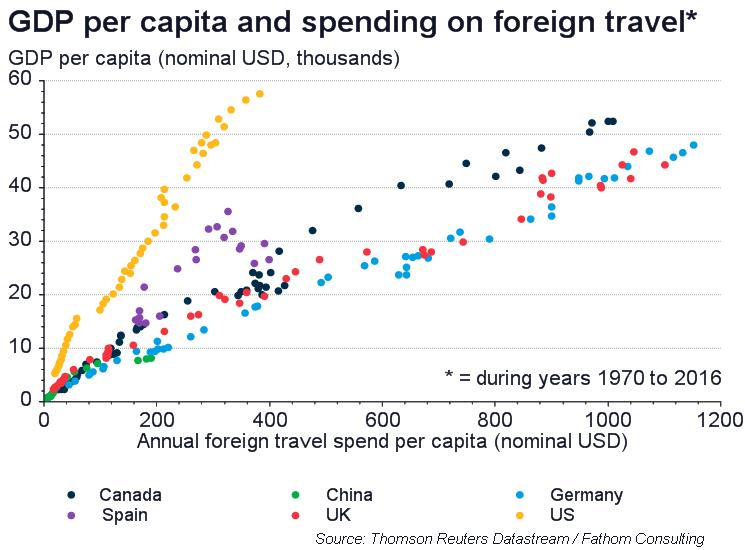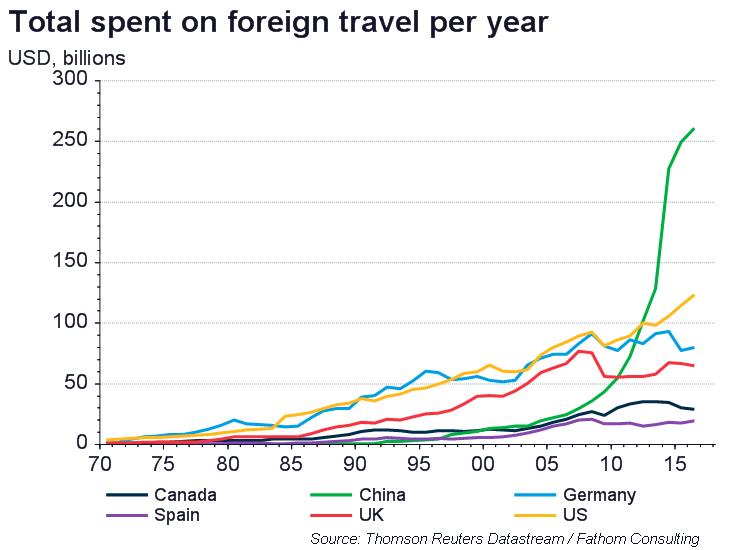A sideways look at economics
In Martin McDonagh’s dark comedy classic, In Bruges, Ray, played by Colin Farrell, gets into a fight with a fellow customer who complains after his date lights a cigarette in the smoking section of a restaurant. Sensing a degree of New World in the puritan diner’s accent, Ray runs through a list of anti-Vietnam War grievances, before punching him in the face, and shouting “That’s for John Lennon!”. The diner, for his part, is totally confused. The joke, we later find out, is that he’s Canadian, not American. Ray is a failed criminal with little interest in international tourism, and even less in the supposed charm of medieval Belgian towns. But experts in the former might have cautioned him not to make assumptions based on someone’s accent. The difference in odds between running into an American tourist or a Canadian one might be smaller than commonly thought.
Foreign travel is a luxury. In economics, that means that demand for it should rise at a faster rate the more incomes increase. As the chart below shows, that pattern seems to hold for European nations. In 2016, the last year for which internationally comparable figures are available, the average UK resident devoted around $1000 to foreign travel. Since 1990, while average incomes have doubled, per capita spending on foreign travel has tripled. It’s a similar story in Germany. Canadians, who on average earn a little more, spend slightly less on overseas travel. But it’s their southern neighbours who are the real outliers. Despite an average income of almost $60,000 per person, which is around $10,000 more than in the UK or Germany, the average American spent just $382 on international tourism, only a third as much as their European counterparts. As a proportion of income, foreign travel expenditure has been declining. In other words, in the US it behaves as an inferior, not a luxury, good (or service). What the heck, guys?

Those with Ray’s anti-American prejudice might point to parochialism to explain their relative lack of foreign adventure. But this neutral economist suspects that it probably reflects something else. There are many reasons people chose to travel, including climate, food, landscape and social media likes. US residents are uniquely able to enjoy a wide variety of all of these within their own borders. Moreover, as noted in a previous TFiF, Americans receive less paid leave than their OECD peers. Reduced spending on travel probably has similar roots to the reduced downtime that can be observed more generally stateside – something that could be made worse by geography. The US is relatively isolated, sharing a contiguous border with just two other countries. Travelling abroad takes longer and is more expensive than for the residents of many other developed markets.
For their part, China’s residents show no sign of America’s Large Country disinterest in foreign travel. In 2016, with an income per person of around $8000, or 15% of the US, the average Chinese resident spent $182 on travel imports, almost half the US equivalent. Due to its large population, that left China as the world’s largest source of tourism spending, at $261 billion, which is around the same as the next three countries combined. It also marks a dramatic increase from the $13 billion spent in 2000. The roots of this wanderlust are not easy to identify. It seems likely that some of the rapid surge is not real, but is actually masked capital exodus. But the data can’t be entirely dismissed. China is located close to many different countries and shares a land border with 14 of them – the highest number in the world – making hopping across state lines easier than elsewhere. Moreover, inequality within the country is high, helping to explain a large average spend per trip. In any case, could this passion prove useful in diplomatic talks?

Many countries have become increasingly frustrated with sustained imbalances in their bilateral trading relationships with China. Its citizens proclivity for travel could help to ease tensions. Since 2009, China’s services deficit has widened from $23 billion to $244 billion; of which, $217 billion is made up by its deficit in travel. At that rate of increase, and assuming its goods surplus remains flat, China’s services deficit would offset its goods surplus within a decade. How about this for a grand bargain? Rich countries continue to purchase goods from the Middle Kingdom, but on condition that the Chinese use this money to visit their countries. US negotiators should find it easier to garner Beijing’s agreement, with California and New York top draws. The EU, on the other hand, might struggle. According to Ray, Bruges is a…is not a very nice town to visit.*
新年快樂 – Happy New Year!
* Ray’s view of Bruges is not shared by Fathomites, several of whom have enjoyed very pleasant mini-breaks in the ‘Venice of the North’.